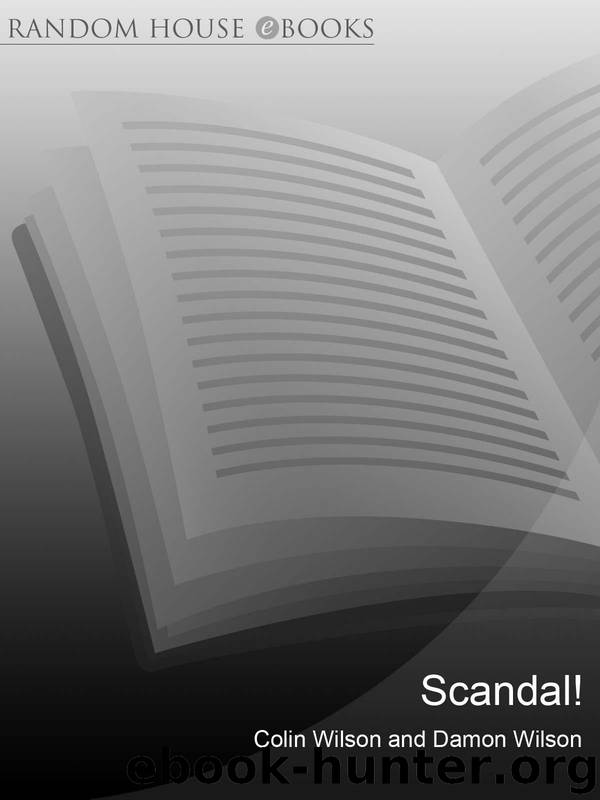Scandal!: An Explosive Exposé of the Affairs, Corruption and Power Struggles of the Rich and Famous by Colin Wilson & Damon Wilson

Author:Colin Wilson & Damon Wilson [Wilson, Colin]
Language: eng
Format: epub
Publisher: Ebury Publishing
Published: 2011-05-31T06:00:00+00:00
KELLY, DAVID
THE DEATH OF A SCIENTIST AND THE PHANTOM IRAQI WEAPONS OF MASS DESTRUCTION
SHORTLY AFTER MIDNIGHT on 18 July 2003, the wife of Dr David Kelly rang the police to report him missing. Kelly, a respected British expert on biological weaponry, had gone for his usual walk at around 3 pm the previous day, but had failed to return.
Oxfordshire police found his corpse in nearby woodland on Harrowdown Hill. The autopsy showed that he had ingested 29 tablets of co-proxamol – a pain-killer that can be fatal in doses of over 20 tablets. The cause of death, however, was apparently blood loss from a severed ulnar artery in his left wrist. A penknife, which Kelly had owned since his boyhood, was found nearby.
Even under normal circumstances the strange death of such an eminent expert would have made headline news. But Kelly had spent the weeks before his death at the heart of a storm of national controversy, accusation and counter-accusation. Sentiments attributed to the softly spoken weapons expert had embarrassed and infuriated the government of Labour Prime Minister, Tony Blair, and had started a battle of words between government ministers and the BBC – the state-funded but supposedly politically impartial British Broadcasting Corporation.
To understand why just a few sentences from Dr Kelly – apparently said off the cuff and ‘unattributably’ to a BBC journalist – had had such an explosive effect, one has to remember just how tumultuous the first half of 2003 had been. In just over a month, between 19 March and 1 May, America and Great Britain had successfully invaded Iraq and deposed its dictator, Saddam Hussein.
So how was it that a highly successful war and the downfall of a tyrant, followed by the apparent suicide of a weapons expert, had somehow managed to put the Blair government on the defensive against a significant proportion of both the British media and general public?
Despite the initial success of the Allies in the Iraq War, many people, in the summer of 2003, were uncertain of the justice or advisability of the invasion. Tony Blair, up to then unassailably popular with a majority of UK voters, was haemorrhaging support over both the war and his close alliance with the Republican administration of US President, George W. Bush. A few strident critics even suggested that the war had been in breach of international law, and that Bush and Blair deserved some day to face criminal indictments. To Tony Blair’s evident amazement supporting a long-term ally, winning a war and toppling a dictator had suddenly ceased to be vote-winners. But, given the events of the previous two years, it was not so surprising.
Less than a month after the terrorist attack of 11 September 2001 killed 2,973 people on American soil, the US and several of their NATO allies (most prominently Britain) started to give decisive military assistance to the Afghan Northern Alliance in their civil war against the Taliban government in Kabul. The result, by December 2001, was the rout and collapse of the Taliban.
Download
This site does not store any files on its server. We only index and link to content provided by other sites. Please contact the content providers to delete copyright contents if any and email us, we'll remove relevant links or contents immediately.
Periodization Training for Sports by Tudor Bompa(8272)
The Body: A Guide for Occupants by Bill Bryson(5096)
The MacArthur Bible Commentary by John MacArthur(4826)
The Sports Rules Book by Human Kinetics(4386)
What It Really Takes to Get Into Ivy League and Other Highly Selective Colleges by Hughes Chuck(3760)
Marijuana Grower's Handbook by Ed Rosenthal(3684)
The Sprouting Book by Ann Wigmore(3592)
The Martian by Andy Weir(3427)
Salt, Fat, Acid, Heat: Mastering the Elements of Good Cooking by Nosrat Samin(3147)
Harry Potter 4 - Harry Potter and The Goblet of Fire by J.K.Rowling(3073)
Sapiens and Homo Deus by Yuval Noah Harari(3071)
The Bread Bible by Rose Levy Beranbaum(3069)
The Marketing Plan Handbook: Develop Big-Picture Marketing Plans for Pennies on the Dollar by Robert W. Bly(3062)
Classic by Mary Berry(3014)
Martha Stewart's Baking Handbook by Martha Stewart(2860)
Screenplay: The Foundations of Screenwriting by Syd Field(2642)
The Plant Paradox by Dr. Steven R. Gundry M.D(2620)
50 Economics Classics by Tom Butler-Bowdon(2571)
The Cambridge Grammar Of The English Language by Rodney Huddleston Geoffrey K. Pullum(2430)
